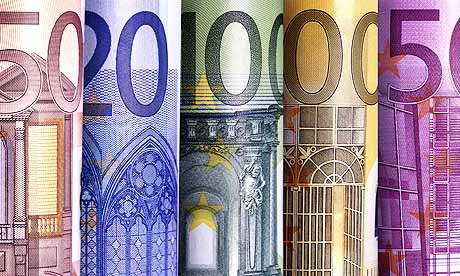Breakup of single currency would blight Europe, says Dutch bank Ing
Knock-on effect on global economy would dwarf aftermath of Lehman Brothers collapse, analysts warn

Inflation in Spain and Portugal could soar towards double digits while Germany would suffer deflationary shock, ING researchers said. Photograph: Corbis
January 2012. A cold winter has settled across Europe while the hard freeze gripping the economies of countries that once made up the eurozone is spreading across the globe. European Monetary Union is over. The stresses and strains caused by the bailout of Greece and the problems that enveloped other peripheral countries has made the euro a distant memory.
This is the scenario explored by economists at Dutch bank ING who have produced one of the first financial models of what might happen if the single currency falls apart during 2010. In a bleak assessment, entitled "quantifying the unthinkable", they warn that in the first year alone, so by the start of 2012, output would fall between 5% and 9% across various member states, while their new national currencies would fall by 50%.
The 16 countries that ditched their own currencies a little over a decade earlier have dusted down the printing presses to try to introduce new domestic notes again. They are doing battle with a crisis that dwarfs the one caused by collapse of Lehman Brothers in 2008.
While Spain and Portugal are grappling with near double-digit inflation, Germany and other core countries are gripped with a deflationary shock, one that has also begun to infect the US which is flirting with a full blown recession. In Britain, the economy is struggling with a double-dip recession inflicted by the euro crisis. With share prices falling and house prices plummeting, governments are facing the prospects of bailing out banks that have been crippled by bad debts caused by corporate defaults.
Mark Cliffe, ING's global head of financial markets research, stressed he is not trying to predict the probability of an EMU break-up, but merely considering what would happen if the once "unthinkable" were to happen. "We do not address the potential long-term pros and cons of dismantling EMU. However, the initial trauma outlined in this report is sufficiently grave to give pause for thought to those who blithely propose EMU exit as a policy option," Cliffe said.
On the basis of a euro break-up by the end of 2010, he warned: "In 2011 a deep recession across the eurozone emerges, dragging down the global economy. In the eurozone output falls range from -4% in Germany to -9% in Greece".
But he notes neighbouring European economies are also caught up in the chill, with GDP falling 3% in the UK and 5% in central and eastern Europe.
"While the US would be less adversely affected, the combination of lower global growth and a strongly appreciating US dollar would see it flirting with outright recession in 2011," Cliffe added.
Some economists have argued that if individual countries inside the eurozone were able to allow their currencies to float freely, their economies would benefit and help them tackle their debt burdens. Cliffe disagrees. "If Greece and other southern European members were to leave, the ensuing currency depreciation would not directly help improve their fiscal solvency problems. In fact, unless they re-denominated their existing debts into their newly depreciating currencies their debt-to-GDP ratios would soar," Cliffe said.
Another argument put forward by those who favour an EMU breakup is that a country might be able to grow more quickly if it were able to benefit from the price competitiveness caused by a free-floating currency. Again, Cliffe is sceptical. He acknowledges that while the markets will seek a "new equilibrium" for the new domestic currencies born out of the euro collapse, the benefits will not be enough to outweigh the lack of domestic demand. "A weaker exchange rate will benefit exports to the rest of the world. However this will not be enough to compensate for the domestic demand collapse," he explained.
As well as considering the impact of a complete break up of EMU, the ING economists also analysed the potential effects of a less dramatic carve-up of the eurozone where a "stage-managed" exit is arranged for Greece. Even in that scenario, the economists describe their predictions as "non-trivial".
While Greek output would fall, the countries that remain in the eurozone would also suffer, with output falling by as much as 1%. The newly created Greek drachma would fall 80% against the euro. "Losses on Greek assets spread the pain across Europe and beyond," the ING analysts said.
He also notes that the "departure of Greece alone would be a major blow to the financial markets' confidence in the sustainability of the EMU".
"The notion of the irreversibility of EMU would be shattered forever."
The euro could slump from around $1.20 in 2010 to $0.85, close to its previous low in 2001 in the Greek departure scenario, while if the euro were to break up altogether the ING analysts expect "huge volatility" in the currencies that are created to replace the euro. For instance, the Spanish peseta, Portuguese escudo and Irish punt could devalue 50% against the new Deutsche mark.
The ING analysts are concerned about the potential for a breakdown in payments systems – and the chaos that would ensue – if EMU collapsed. Cliffe also asks: "What would [an EMU break up] do to the politics of Europe? That would have also have economic consequences".
While there are those who argue that the break-up of the EMU could help kickstart troubled economies in the eurozone, the ING economists calculate the loss of output in the first two years would be close to 10% – dwarfing the fall caused by the collapse of Lehman.

No comments:
Post a Comment